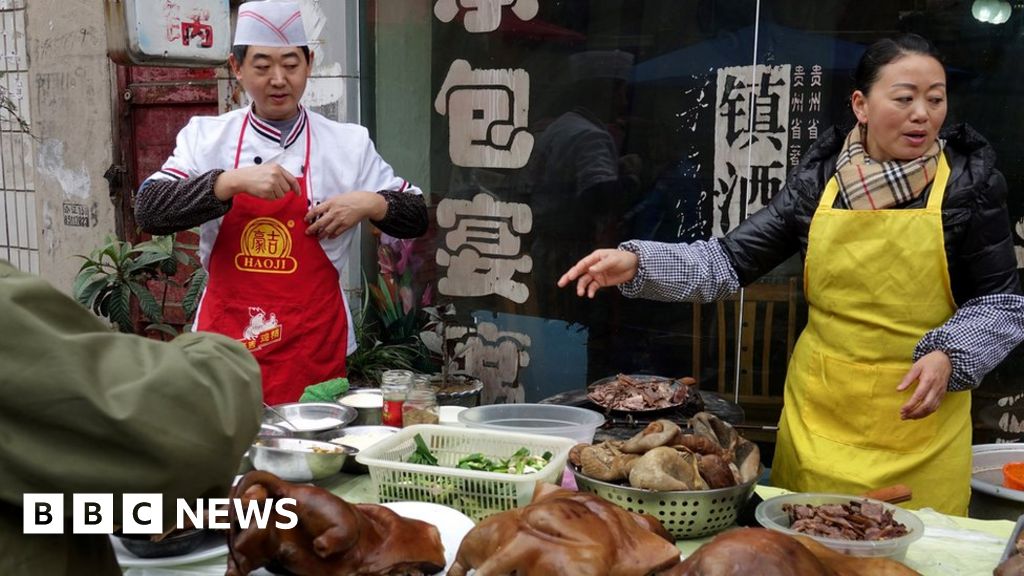Taiwan has banned the selling and eating of cats and dogs after a series of cruelty cases that caused widespread outrage.
The new Animal Protection Act will see anyone selling, eating or buying the animals for consumption facing fines of up to £6,500.
Those found guilty of animal cruelty could also receive a huge fine of £52,000 and two years in prison.
Taiwan is the first Asian country to crack down on the practice.
The new law tackles long-standing cultural beliefs about the benefits of eating dogs – for example, eating black dogs in winter is supposed to help you stay warm.
It was pushed through by President Tsai Ing-wen, who adopted three retired guide dogs last year and also has two cats, named Cookie and A-Tsai.
The practice of eating cats and dogs has become less common as pet ownership rises, and new generations have different attitudes to eating domestic animals.
But an estimated 30 million dogs across Asia, including stolen family pets, are still killed for human consumption every year, according to the Humane Society International.
While not widespread, the charity says the practice is most common in China, South Korea, The Philippines, Thailand, Laos, Vietnam, Cambodia and the region of Nagaland in India.
Although accurate figures are difficult to obtain, China is believed to be responsible for the majority of global cases of cat and dog slaughter.
Each year, around four million cats and 10 million dogs are believed to be slaughtered in the country. The Humane Society says the majority are stolen pets and strays that are captured and kept in cages.
The tradition of eating dogs dates back thousands of years, even though they are often kept as pets.
Each year in June, the city of Yulin in southern China hosts a dog meat festival, where live dogs and cats are sold specifically for eating and an estimated 10,000 are slaughtered for their meat.
But last year saw big protests against the festival from within China as well as in the West.
In South Korea, dog meat dishes are so common that they have their own name – Gaegogi.
The country has an estimated 17,000 dog farms, according to the Humane Society, where animals are routinely prepared for human consumption.
However, similar to other countries, pressure from welfare groups is having an impact.
In February, the biggest dog meat market in Seongnam was closed down as part of a wider crackdown ahead of the country's hosting of the Winter Olympics next year.
Around five million dogs are believed to be slaughtered for eating in the country each year.
And the demand has led to an illegal trade from neighbouring countries, including Thailand, Cambodia and Laos.
The Asia Canine Protection Alliance (Acpa), which lobbies governments to try to end the dog meat trade, says there is some evidence that the dog meat trade is dangerous to humans, leading to an increase in diseases like rabies.
Acpa's focus is to end the illegal trade of dogs from Thailand and Laos into Vietnam, where an estimated five million dogs are slaughtered every year for human consumption, by tackling both the supply of dogs from Thailand and Laos, and the demand for dogs for consumption in Vietnam.
Find us on Instagram at BBCNewsbeat and follow us on Snapchat, search for bbc_newsbeat
US House approves $61bn in aid for Ukraine war effort
US Speaker may pay political price for Ukraine deal
Explosion hits Iraq base housing pro-Iranian militia
An audible sigh of relief in the Middle East
How Taylor Swift captured modern dating despair
An attack on women that has devastated Australia
What we know about Israel's missile attack on Iran
From WhatsApp to Greggs – why is tech going down more?
After hunt for impartiality, who are the 12 Trump jurors?
Can AI help solve Japan’s labour shortages?
Disasters, dancers and a Duke: Photos of the week
Baby Reindeer star on 'role of a lifetime' in disturbing stalker drama
'I'm not difficult… I just cannot take mediocrity'
Explore the meteoric rise to fame and troubled personal life of the comedy pioneer Peter Sellers
Unearthing the fascinating stories of our ancestors
Britain's Biggest Dig gives a glimpse into the life of the rich and poor of Georgian London
Profound revelation, glorious chaos and a lot of laughs
Michael Sheen faces the interview of a lifetime where no question is off the table
Fancy a film?
There's something for everyone on BBC iPlayer
© 2024 BBC. The BBC is not responsible for the content of external sites. Read about our approach to external linking.

